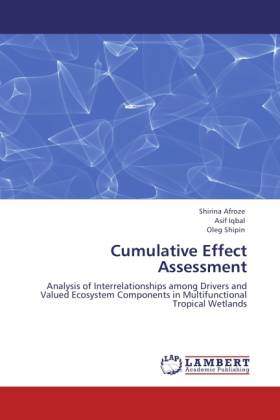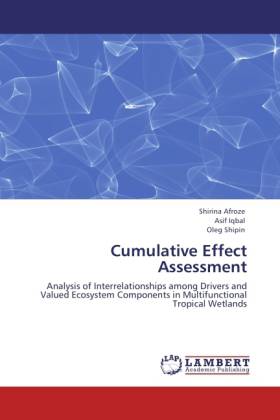
Bedankt voor het vertrouwen het afgelopen jaar! Om jou te bedanken bieden we GRATIS verzending (in België) aan op alles gedurende de hele maand januari.
- Afhalen na 1 uur in een winkel met voorraad
- In januari gratis thuislevering in België
- Ruim aanbod met 7 miljoen producten
Bedankt voor het vertrouwen het afgelopen jaar! Om jou te bedanken bieden we GRATIS verzending (in België) aan op alles gedurende de hele maand januari.
- Afhalen na 1 uur in een winkel met voorraad
- In januari gratis thuislevering in België
- Ruim aanbod met 7 miljoen producten
Zoeken
Cumulative Effect Assessment
Analysis of Interrelationships among Drivers and Valued Ecosystem Components in Multifunctional Tropical Wetlands
Shirina Afroze, Asif Iqbal, Oleg Shipin
Paperback | Engels
€ 80,45
+ 160 punten
Omschrijving
The concept of cumulative effect assessment (CEA) as a theory and tool for the quantitative assessment of cumulative effects (impacts) on multifunctional wetlands was furthered in view of a an inherent and chronic lack of environmental data sets in the vast majority of ecosystems in the developing Asia that is a major stumbling block on the way of CEA. Whereas expert opinion as a CEA method has been long recognized, a participatory rural appraisal (PRA) as another important method was largely overlooked despite its strong validity under the circumstances when the required environmental data sets are not available. The gaps due to the lack of parametric data hence call for further development of PRA to complement with the CEA tool. The need to overcome the shortage of data sets is thought to be particularly important due to the fact that the developing world comprises most of the world s ecosystems, biodiversity and human population.
Specificaties
Betrokkenen
- Auteur(s):
- Uitgeverij:
Inhoud
- Aantal bladzijden:
- 128
- Taal:
- Engels
Eigenschappen
- Productcode (EAN):
- 9783846500194
- Verschijningsdatum:
- 14/09/2011
- Uitvoering:
- Paperback
- Afmetingen:
- 152 mm x 229 mm
- Gewicht:
- 200 g

Alleen bij Standaard Boekhandel
+ 160 punten op je klantenkaart van Standaard Boekhandel
Beoordelingen
We publiceren alleen reviews die voldoen aan de voorwaarden voor reviews. Bekijk onze voorwaarden voor reviews.









